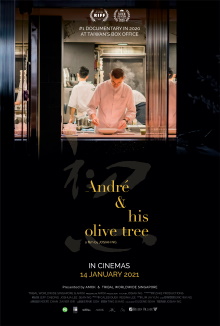André Chiang is feted as Taiwan’s first and so far only Michelin-starred chef and is apparently considered one of best Chinese-born chefs in the world, making him a great subject for a documentary. Yet the climax that this entire film builds towards is the closure of his famous restaurant in Singapore, apparently quite a shock to everyone at the moment, making the film itself feel rather different from other celebrity biographies. There were times when I felt annoyed by this documentary as it felt too much like a posh advertisement for Chiang but it improves immeasurably after the man lets down his guard a bit in his native Taiwan and allows his more personal side to be shown.
It can be tough to find a central tension to drive a biographical documentary, and here director Josiah Ng chooses to frame his film around André Chiang’s decision to close his restaurant at the height of his career. With two Michelin stars under his belt and a sense within the culinary world and among his own staff that they were heading towards a third star, this was understandably a surprise. Chiang’s attention to detail and OCD tendencies to get everything perfect is obvious but then again, we already know that this is merely the minimum bar to entry at the elite level Chiang operates in. More interesting is his emphasis on growing his team and his claim that he hires unskilled staff and trains them from the ground up. I also liked how he has his Thai wife Pam act as effectively his business manager and how he likes to welcome guests arriving in front of his restaurant’s door as part of the dining experience. Chiang explains his decision to close his restaurant and hand in his stars as part of non-stop evolving and growing as he feels he has already achieved what he could with that restaurant and didn’t have to prove anything more to anyone. However judging by the later scenes, it seems to me more like he really wanted to return home to his native Taiwan and was perhaps being a bit too worn down by the constant attention and excessively high expectations in Singapore.
In choosing the closure of the restaurant to focus on, this documentary makes some glaring omissions. Chiang left home at a very young age to for culinary training in France without knowing French. That must have been quite a story but the only notable mention of it here is that his mother worried about him losing a lot of weight soon after arriving in France. Even worse, after watching this documentary you have will gained no knowledge of what Chiang’s culinary style is, if he has any, or if he became famous for any particular dishes. We see him overseeing his staff, correcting their mistakes and so on, but the dishes are never named and we never get a close look at any of them. Ironically the one dish that we see him cook himself is very old-fashioned beef noodles that he makes for his staff and guests for the last day of the restaurant. He says the greatest praise he ever received is when his old mentor Jacques Pourcel notes that he doesn’t recognize any of the dishes he is served so it’s all André but what those dishes are we never see. It’s so odd that we get fluff about his culinary philosophy, raving comments from food critics and staff but so little about the actual food that he makes or even the ingredients that he uses.
In that sense, this documentary isn’t about food at all. It wasn’t made to answer the question of what kind of food does one of the world’s best chefs serve. Instead it is aspirational, which feels very Singaporean. It is trying to answer the question of what is the mindset of one of world’s greatest achievers, how does he spend his working day together with a small helping of what his personal life behind the scenes is like. A great anecdote in this film recounts one of his employees from South Korea coming to Singapore without a return ticket and getting a job by simply refusing to leave until she is hired. The lesson here is that single-minded determination and a refusal to give up works. I also liked how he praises the simple food served at the Shilin Night Market, analyzing the constraints they have to operate under, including needing to be cheap and practical. Again, it’s a very entrepreneur-minded approach, aiming to satisfy the audience’s curiosity of different people’s paths to success, rather than being about the food itself.
This isn’t quite what I’d hoped to see in a documentary about one of the world’s most celebrated chefs and indeed the early parts are especially irritating in feeling like a slick advertisement that doesn’t say anything of substance. It gets better when more of Chiang’s personal side is shown and I find myself rather sympathizing with his decision to shut the Singaporean restaurant down to actually enjoy the fruits of his success with a spacious house in Taiwan. The comments from his wife Pam are even more intimate, revealing some of the sacrifices and compromises, or perhaps simply some roads not taken, in getting to where they are. Overall this is a documentary worth watching primarily because of the richness of its subject, the chef André Chiang himself. But I don’t think this is particularly good work on the part of its director Ng.
